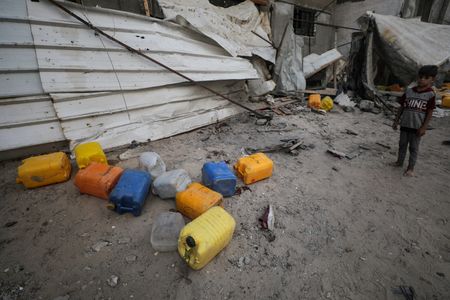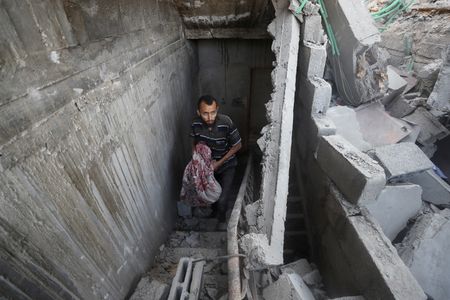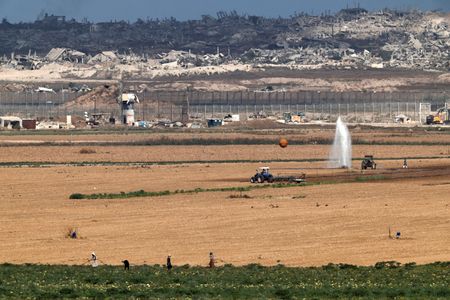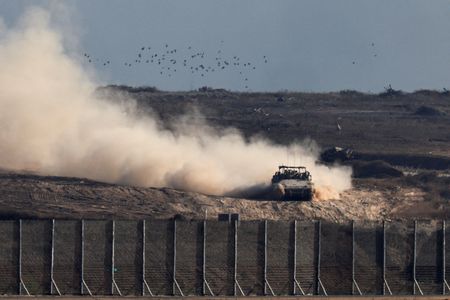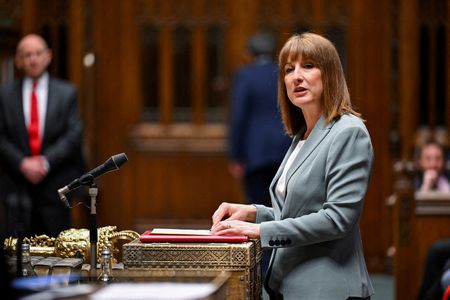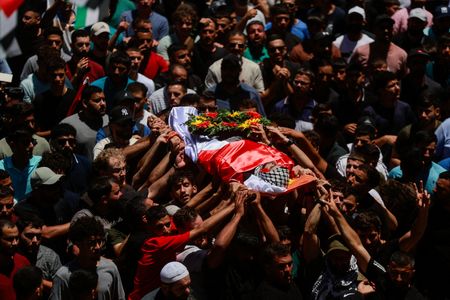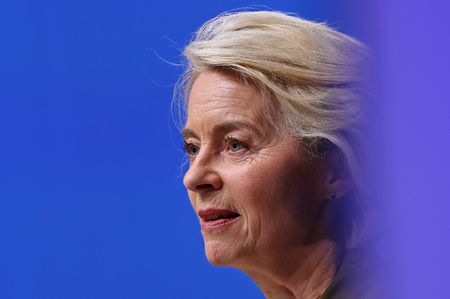By Crispian Balmer
JERUSALEM (Reuters) -At least eight Palestinians, most of them children, were killed and more than a dozen were wounded in central Gaza when they went to collect water on Sunday, local officials said, in an Israeli strike which the military said missed its target.
The Israeli military said the missile had intended to hit an Islamic Jihad militant in the area but that a malfunction had caused it to fall “dozens of metres from the target”.
“The IDF regrets any harm to uninvolved civilians,” it said in a statement, adding that the incident was under review.
The strike hit a water distribution point in Nuseirat refugee camp, killing six children and injuring 17 others, said Ahmed Abu Saifan, an emergency physician at Al-Awda Hospital.
Water shortages in Gaza have worsened sharply in recent weeks, with fuel shortages causing desalination and sanitation facilities to close, making people dependent on collection centres where they can fill up their plastic containers.
Hours later, 12 people were killed by an Israeli strike on a market in Gaza City, including a prominent hospital consultant, Ahmad Qandil, Palestinian media reported. The Israeli military did not immediately comment on the attack.
Gaza’s health ministry said on Sunday that more than 58,000 people had been killed since the start of the war between Israel and Hamas in October 2023, with 139 people added to the death toll over the past 24 hours.
The ministry does not distinguish between civilians and fighters in its tally, but says over half of those killed are women and children.
CEASEFIRE?
U.S. President Donald Trump’s Middle East envoy Steve Witkoff said on Sunday that he was “hopeful” on Gaza ceasefire negotiations underway in Qatar.
He told reporters in Teterboro, New Jersey, that he planned to meet senior Qatari officials on the sidelines of the FIFA Club World Cup final.
However, negotiations aimed at securing a ceasefire have been stalling, with the two sides divided over the extent of an eventual Israeli withdrawal from the Palestinian enclave, Palestinian and Israeli sources said at the weekend.
Israeli Prime Minister Benjamin Netanyahu was set to convene ministers late on Sunday to discuss the latest developments in the talks, an Israeli official said.
The indirect talks over a U.S. proposal for a 60-day ceasefire are being held in Doha, but optimism that surfaced last week of a looming deal has largely faded, with both sides accusing each other of intransigence.
Netanyahu in a video he posted on Telegram on Sunday said Israel would not back down from its core demands – releasing all the hostages still in Gaza, destroying Hamas and ensuring Gaza will never again be a threat to Israel.
The war began on October 7, 2023, when Hamas-led militants stormed into Israel, killing about 1,200 people and taking 251 hostages into Gaza. At least 20 of the remaining 50 hostages there are believed to still be alive.
Families of hostages gathered outside Netanyahu’s office in Jerusalem to call for a deal.
“The overwhelming majority of the people of Israel have spoken loudly and clearly. We want to do a deal, even at the cost of ending this war, and we want to do it now,” said Jon Polin, whose son Hersh Goldberg-Polin was held hostage by Hamas in a Gaza tunnel and slain by his captors in August 2024.
Netanyahu and his ministers were also set to discuss a plan on Sunday to move hundreds of thousands of Gazans to the southern area of Rafah, in what Israeli Defence Minister Israel Katz has described as a new “humanitarian city” but which would be likely to draw international criticism for forced displacement.
An Israeli source briefed on discussions in Israel said that the plan was to establish the complex in Rafah during the ceasefire, if it is reached.
On Saturday, a Palestinian source familiar with the truce talks said that Hamas rejected withdrawal maps which Israel proposed, because they would leave around 40% of the territory under Israeli control, including all of Rafah.
Israel’s campaign against Hamas has displaced almost the entire population of more than 2 million people, but Gazans say nowhere is safe in the coastal enclave.
Early on Sunday morning, a missile hit a house in Gaza City where a family had moved after receiving an evacuation order from their home in the southern outskirts.
“My aunt, her husband and the children, are gone. What is the fault of the children who died in an ugly bloody massacre at dawn?” said Anas Matar, standing in the rubble of the building.
(Additional reporting by Emily Rose and Maayan Lubell in Jerusalem; Mahmoud Issa in Gaza, Ali Sawafta in Ramallah and Heba Fouad in Cairo; Editing by Ros Russell, Jane Merriman and Chizu Nomiyama )

